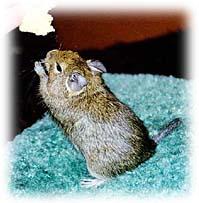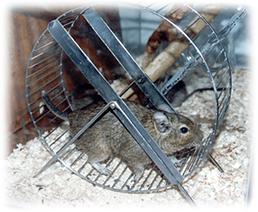Behavior
 Degus are very social and friendly animals that have no fear instinct. They should always be kept with at least one other degu or they will get depressed and sick. When there are two or more degus together they will play, talk and groom each other. If other degus aren't available, a lone degu can live together with rabbits, chinchillas and guinea pigs if they are introduced slowly. Always keep male and female degus sepreate though, and never have two males together if a female is within smelling distance. If kept together, the females will constantly be pregnant which will diminish their lifespan considerably.
Degus are very social and friendly animals that have no fear instinct. They should always be kept with at least one other degu or they will get depressed and sick. When there are two or more degus together they will play, talk and groom each other. If other degus aren't available, a lone degu can live together with rabbits, chinchillas and guinea pigs if they are introduced slowly. Always keep male and female degus sepreate though, and never have two males together if a female is within smelling distance. If kept together, the females will constantly be pregnant which will diminish their lifespan considerably.
The fact that degus are fearless puts them in great danger from cats as if a cat approaches the cage, the degu is likely to run towards it and investigate. It is up to the pet owner to take precautions to protect the degus from hazards like this.
Degus are day animals and will be most active in the morning or early evening. They love to run in their wheel, build nests and climb on their bars. They nap often, sometimes just resting with their eyes half open similar to cats. They are very curious and will explore any area you allow them to run free in. They know their home though, so if a degu escapes, all you need to do is leave the cage open and the degu will return to it once it is hungry or scared. Degus will chew on anything.
 In the wild the biggest danger to degus is flying predators, so they have an automatic fear to anything swooping down from above. For this reason, you must never try to pick up a degu that way. Instead rest your open palm near the degu and it will crawl onto your hand. It helps to verbally reassure the animal, as degus can recognize the voices of people and know who they can trust. If you hurt a degu once, it will never allow you near it again.
In the wild the biggest danger to degus is flying predators, so they have an automatic fear to anything swooping down from above. For this reason, you must never try to pick up a degu that way. Instead rest your open palm near the degu and it will crawl onto your hand. It helps to verbally reassure the animal, as degus can recognize the voices of people and know who they can trust. If you hurt a degu once, it will never allow you near it again.
If a degu gets attacked or is sufficiently scared the tail can drop off or the skin on the tip of the tail can slough off. This will never grow back. This doesn't hurt the degu, although it can bleed at first, and it can interfere with balance when jumping and climbing. If the tip sloughs off, the exposed part of the tail will dry up and either drop off or be chewed off by the degu.
Home ·
General Information ·
Behavior ·
Feeding ·
Housing ·
Links ·
Mona the Degu ·
 Degus are very social and friendly animals that have no fear instinct. They should always be kept with at least one other degu or they will get depressed and sick. When there are two or more degus together they will play, talk and groom each other. If other degus aren't available, a lone degu can live together with rabbits, chinchillas and guinea pigs if they are introduced slowly. Always keep male and female degus sepreate though, and never have two males together if a female is within smelling distance. If kept together, the females will constantly be pregnant which will diminish their lifespan considerably.
Degus are very social and friendly animals that have no fear instinct. They should always be kept with at least one other degu or they will get depressed and sick. When there are two or more degus together they will play, talk and groom each other. If other degus aren't available, a lone degu can live together with rabbits, chinchillas and guinea pigs if they are introduced slowly. Always keep male and female degus sepreate though, and never have two males together if a female is within smelling distance. If kept together, the females will constantly be pregnant which will diminish their lifespan considerably. In the wild the biggest danger to degus is flying predators, so they have an automatic fear to anything swooping down from above. For this reason, you must never try to pick up a degu that way. Instead rest your open palm near the degu and it will crawl onto your hand. It helps to verbally reassure the animal, as degus can recognize the voices of people and know who they can trust. If you hurt a degu once, it will never allow you near it again.
In the wild the biggest danger to degus is flying predators, so they have an automatic fear to anything swooping down from above. For this reason, you must never try to pick up a degu that way. Instead rest your open palm near the degu and it will crawl onto your hand. It helps to verbally reassure the animal, as degus can recognize the voices of people and know who they can trust. If you hurt a degu once, it will never allow you near it again.